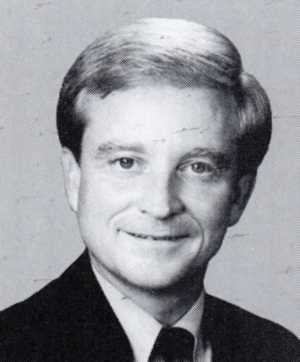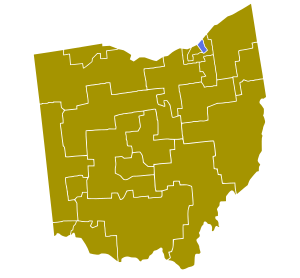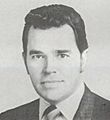Douglas Applegate facts for kids
Quick facts for kids
Douglas Applegate
|
|
|---|---|
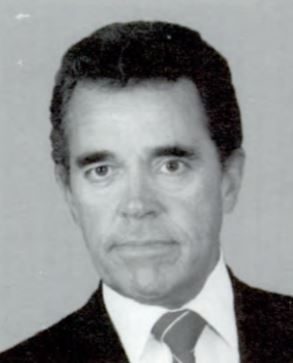 |
|
| Member of the U.S. House of Representatives from Ohio's 18th district |
|
| In office January 3, 1977 – January 3, 1995 |
|
| Preceded by | Wayne Hays |
| Succeeded by | Bob Ney |
| Member of the Ohio Senate from the 30th district |
|
| In office 1969–1977 |
|
| Preceded by | John Longsworth |
| Succeeded by | Kinsey Milleson |
| Member of the Ohio House of Representatives | |
| In office 1961–1969 Serving with Michael Blischak (1961–1963)
|
|
| Preceded by | District established (33rd district) |
| Succeeded by | Arthur Bowers |
| Constituency | Jefferson County (1961–1967) 33rd district (1967–1969) |
| Personal details | |
| Born |
Douglas Earl Applegate
March 27, 1928 Steubenville, Ohio, U.S. |
| Died | August 7, 2021 (aged 93) Spring Hill, Florida, U.S. |
| Political party | Democratic |
| Spouse | Betty |
| Children | 2 |
| Signature | |
Douglas Earl Applegate (born March 27, 1928 – died August 7, 2021) was an American politician. He served in the United States House of Representatives for Ohio from 1977 to 1995. He was a member of the Democratic Party. Before working in the U.S. House, he was in the Ohio House of Representatives from 1961 to 1968. He also served in the Ohio Senate from 1969 to 1974.
Applegate was born in Steubenville, Ohio. His father, Earl Applegate, was also a politician. Douglas Applegate went to Steubenville High School. He was known for his work on committees related to transportation and veterans' affairs. He even ran for president in 1988, but mostly to bring attention to issues in his home district.
Early Life and Education
Douglas Earl Applegate was born on March 27, 1928, in Steubenville, Ohio. His father, Earl Applegate, was the mayor of Steubenville. He also served in the Ohio House of Representatives. Douglas graduated from Steubenville High School in 1947. Later, in 1956, he became a licensed real estate broker. Douglas Applegate had two children with his wife, Betty. He was a member of the Presbyterian church.
Political Career
Ohio Legislature
Becoming a State Representative
In 1960, Douglas Applegate and Michael Blischak were chosen by the Democratic Party. They ran for seats in the Ohio House of Representatives. They won against their Republican opponents. In 1962, Applegate ran for reelection. He won against Blischak in the primary election. He also won the general election against the Republican candidate. He was reelected again in 1964 and 1966.
Moving to the State Senate
On January 29, 1968, Applegate announced he would run for the Ohio Senate. He wanted to represent the 30th district. He won the Democratic primary against several other candidates. In the main election, he defeated the Republican Senator John Longsworth. He was the only person in Ohio to beat an incumbent state senator that year.
After new district maps in 1972, Applegate's district changed. It now included Republican Senator Kenneth F. Berry. Applegate won reelection against Berry.
Work in the Ohio Legislature
In 1963, Applegate was chosen for the House Democratic Policy committee. In the state house, he worked on committees like Elections and Health. When he was in the state senate, he served on committees such as Finance and Labor. In 1974, he became the chairman of the new Energy and Environment committee.
He also served on important state groups. These included the Ohio Controlling Board. In 1970, he became the Assistant Minority Leader. This meant he helped lead the Democratic Party in the state senate.
Applegate was a delegate at the 1964 Democratic National Convention. He also helped manage Michael E. Entinger's campaign in 1966. This was for the Democratic nomination for Ohio State Treasurer.
In 1965, the U.S. Junior Chamber of Commerce named Applegate one of America's outstanding young men.
U.S. House of Representatives
How He Got There
In 1975, Applegate planned to run for the U.S. House of Representatives in 1978. This was after Representative Wayne Hays said he would run for governor. But Hays later resigned from the House in 1976. So, Applegate was chosen to take his place as the Democratic nominee for the 1976 election. He was chosen unanimously by the Democratic leaders in the district.
Applegate won the 1976 election. He defeated Republican Ralph R. McCoy and independent candidate William Crabbe.
Reelections and Retirement
Applegate ran for reelection many times and won. He won in 1978, 1980, 1982, 1984, 1986, 1988, 1990, and 1992. He often won by large margins.
On January 3, 1994, Applegate announced he would not seek reelection. This meant he was retiring from Congress. His district was then won by Republican Bob Ney.
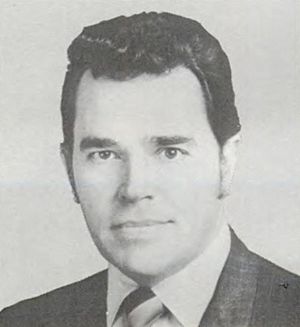
What He Did in Congress
While in the House, Applegate served on important committees. These included the Transportation Committee. He also served on the Public Works Committee. And he was on the Veterans' Affairs Committee. He even chaired a subcommittee on Water Resources and Environment.
He worked to support the use of coal. This was to help reduce the United States' reliance on oil from other countries. He also supported a balanced budget amendment.
Presidential Campaign
In 1987, Applegate announced he would run for president. This was during the 1988 Democratic presidential primary. He knew he wouldn't become president. His main goal was to bring attention to issues in his home district. He wanted to win the six delegates from his district.
He won one delegate from Ohio. He placed second in his district behind Michael Dukakis. Applegate used his delegate to lobby Dukakis at the Democratic National Convention. He wanted Dukakis to focus on issues important to his district. He also hoped that Senator John Glenn would be chosen as the vice-presidential nominee.
Later Life
After retiring from Congress, Applegate remained involved in politics. In 2006, he supported Zack Space for the Democratic nomination. This was for his old congressional district. He had to clarify that he was not related to another candidate named Ralph Applegate. Later in his life, he moved to Spring Hill, Florida. His wife, Betty, passed away in 2020. Douglas Applegate died on August 7, 2021.
Political Views
Economy and Workers
Applegate supported a large budget for Ohio in 1963 and 1973. He voted to cut the budget for the United States Department of State in 1979. He was against getting rid of the United States Department of Veterans Affairs. This department helps military veterans.
He voted for a tax cut in 1977. He also supported giving a large loan to the car company Chrysler. He was against a fee on gasoline. In 1989, he voted to raise the minimum wage. This helps workers earn more money. He also opposed the North American Free Trade Agreement (NAFTA).
Environment
Applegate cared about the environment. In 1971, he proposed a law to change Ohio's Constitution. This law would give people the right to clean air and water. He also asked for an investigation into pollution in Yellow Creek. He wanted to increase penalties for air pollution.
He helped create a state Department of Environmental Protection in Ohio. This agency would combine different groups that protect nature. However, he was against some strict rules on coal use. He felt they would hurt the economy in Ohio.
Equality
In 1978, Applegate voted against extending the deadline for the Equal Rights Amendment. This amendment aimed to ensure equal rights for all citizens regardless of sex. He generally had a good rating from civil rights groups.
Foreign Policy
Applegate supported helping Taiwan. He was against permanent normal trade relations with China. He also supported creating a radio station to broadcast programs against Fidel Castro in Cuba.
He was against sending military aid to Turkey. He also opposed making nerve gas for chemical warfare. He supported reducing nuclear weapons. He voted against sending military aid to the Contras in Nicaragua.
Applegate was against sending American soldiers to Saudi Arabia. He also criticized President George H. W. Bush's plans in the Persian Gulf. He voted against using military force against Iraq in 1991. He later supported withdrawing U.S. soldiers from Lebanon after a bombing there.
He voted against allowing the South Africa national rugby team to play in the U.S. This was because of South Africa's apartheid policies. He voted to override President Reagan's veto of the Comprehensive Anti-Apartheid Act.
Applegate voted to stop aid or trade with Cuba and Vietnam. He also worked to find out what happened to American soldiers missing in action from the Vietnam War.
Flag Desecration
In 1967, Applegate proposed a law in Ohio to increase penalties for flag desecration. This meant damaging or disrespecting the American or Ohio flags. He wanted to crack down on anti-Vietnam War protesters who disrespected the flag. The law passed in the state house. In 1979, he proposed a law to deport any non-citizen who disrespected the American flag. He also supported a constitutional amendment to protect the flag.
Images for kids
 | Dorothy Vaughan |
 | Charles Henry Turner |
 | Hildrus Poindexter |
 | Henry Cecil McBay |


